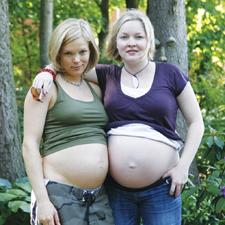When Alison Reid read an article about a scientific breakthrough in reproductive technology, it inspired her to make the movie The Baby Formula.
A team of scientists led by Dr Tomohiro Kono, a biologist at the Tokyo University of Agriculture, had created mice without any sperm. The scientists had fused the genetic contents of two mouse eggs, demonstrating for the first time in 2004 that mammals can reproduce without a male.
“It really struck me,” says Reid, “number one because I’m fascinated by the science of it, and secondly I think it’s sad when people are in love and can’t have children together, whether they’re heterosexual or gay.
“And it’s just never been an option for us, and I thought that would be an incredible option,” she says.
After further research, Reid learned that in April 2006 professor Karim Nayernia, a stem cell biologist at Newcastle University, also produced six live mouse pups using artificial sperm made from female embryonic stem cells.
But the success created in the lab by techniques eliminating the father’s role in mice reproduction is a feat far from ready for human application.
The original motivation behind the science of creating lab-grown sperm was apparently to help straight men with low sperm counts. But Reid jumped on the possibilities for same-sex couples.
“If it was approved and safe, and I was in relationship and I wanted my own biological child with somebody else, you bet I would do it,” she says.
In a mock-documentary format, Reid’s movie (which screens Mar 4 and 7 at Vancouver’s Women in Film Festival) follows a fictional lesbian couple through their pregnancies as they carry their semen-less seeds to term.
It’s not Reid’s first foray into the question of conception. Several years ago Reid and lead actresses Angela Vint (who plays Athena) and Megan Fahlenbock (who plays Lilith) made Succubus together, a short film where the couple’s attempt to conceive their own biological child through science fails.
Six months later, while Reid was at the Toronto festival circuit with Succubus, she learned that both actresses were pregnant.
In record time, the writer, Richard Beattie transformed the short into a feature to allow the movie to shoot over the course of Vint’s and Fahlenbock’s pregnancies.
Beattie admits the movie takes a gigantic leap of faith when the couple uses an experimental scientific process to make sperm from their own stem cells. But he says what interests him are the questions and issues the parents face.
“If you’re going to do something like that you know there’s a certain risk of failure, of catastrophic failure. How do you deal with that?” he asks.
Besides raising social and ethical issues surrounding same-sex reproduction, the movie also includes criticisms from Athena’s rightwing mother. She accuses the couple of trying to play God by hijacking the concept of Immaculate Conception.
Vint believes the film demonstrates that reproductive science can open up a realm of possibilities, not only for same-sex couples but for any couple with fertility problems who want their own biological child. “I think it’s time to move on with the times and I think, of course, there’s going to be an element that believe this is wrong, that it might be against nature, or against religion, or how God might see it. But science is moving at a really fast pace, and I think that society has to start keeping up because the things that we are going to discover in the next 10 or 20 years are going to take us to a higher place.
“Shutting down the possibilities is the wrong way to go,” adds the mother of a now 18-month-old baby.
Dr Albert Yuzpe, co-director of the Genesis Fertility Clinic in Vancouver, says the idea of a lesbian couple giving birth to their own sperm-less child seems more like science fiction than reality at this point.
“I haven’t seen anything in medical literature,” he says. “It’s one thing to do something in animals and another to then reproduce it in humans.”
He agrees that it’s theoretically possible that human stem cells could be manipulated to replicate any tissue type in the human body. If human stem cells could be manipulated into sperm cells or even eggs cells, two people of the same sex could have their own biological child. A gay man could donate skin cells that could be used to make eggs, and scientists could fertilize it with his partner’s sperm and place it into the uterus of a surrogate mother.
But Yuzpe is clear that this science is nowhere close to being around the corner.
Dr Timothy Rowe, the division head of reproductive endocrinology and infertility and a professor of obstetrics and gynecology at the University of British Columbia, agrees. “Look how long it’s taken to get reasonably successful at in vitro fertilization. In the ’70s, it took about eight years before the first successful pregnancy occurred. And then pregnancy rates remained stuck at about 15-20 percent per embryo transfer for about 20 years. It wasn’t until 1999, 2000 that the rates started to improve significantly.”
While Yuzpe is skeptical about the future of same-sex reproduction, Rowe believes it’s going to be possible to do anything in the future.
Some gigantic hurdles to overcome to make men inconsequential in reproduction include the obvious lack of a male Y chromosome in females. Dr Andras Nagy, a senior scientist at the Samuel Lunenfeld Research Institute in Toronto who consulted on the film, explains that the Y chromosome has a critical function for sperm formation.
“How it is going to be substituted to a female cell is still an open question,” says Nagy. Without a Y chromosome, lesbian couples would be limited to female babies.
Nagy believes public support for stem cell research is important. “We need the public support as much as possible to carry on with the required speed of this research.”

 Why you can trust Xtra
Why you can trust Xtra


